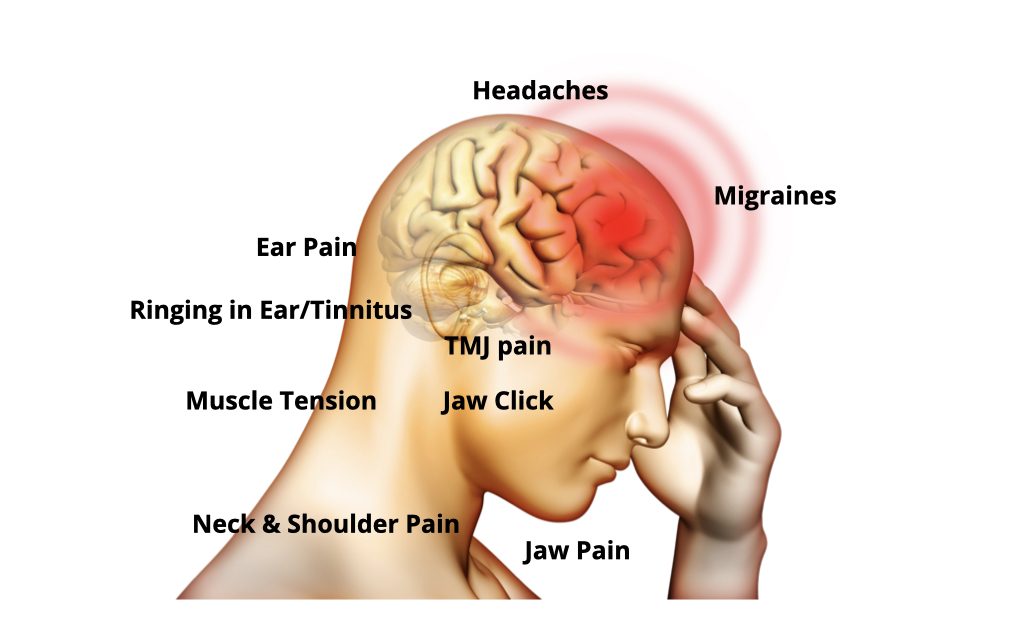Research estimates that over half of the population experiences some signs and symptoms of TMD (Temporo-Mandibular Disorder). Many of the patients left untreated have continuing underlying pathology that decreases the qualify of their lives.
Typical signs and symptoms of TMD include:
- Recurring shoulder, next, or back pain or tension
- Ringing in ear(s)
- Pain or headaches
- Migraines
- Pain or tension in facial muscles
- Clicking in jaw joint (or grinding sounds)
- Tingling in fingers (or numbness)
- Dizziness or vertigo
- Loss of range of motion (limited opening)
- Grinding and clenching
- Worn teeth
- Chipped or broken teeth
- Fracture lines in teeth
- Retruded lower jaw or deep overbite
- Short lower third of the face or increased lines, especially Marionette lines
- Abfractions at gumline
- Snoring or sleep apnea
Without treatment, TMJ problems may lead to chronic jaw pain, recurring headaches, and other adverse effects. Chronic pain, and other symptoms related to this condition can impact your quality of life and increase anxiety and depression as well as dependence on prescription pain medication.
Many TMD patients are misdiagnosed or not properly treated due to lack of knowledge and training as well as understanding by healthcare professionals. Many people seek medical advice only to be sent from doctor to doctor, specialist, pain clinic, alternative medicine, and simply be given prescription medication to manage their chronic pain.
Diagnosis is not the only Challenge
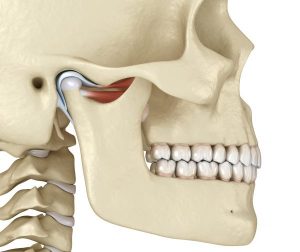 Due to a lack of knowledge and understanding around facial, head and jaw pain, many doctors and dentists are unable to correctly diagnose and treat TMD patients. As a result, many chronic pain sufferers end up giving up and suffering with their symptoms while adjusting and limiting their quality of life to manage the intensity and frequency of pain. But most often, TMD, migraines and head pain are all related to the way your TMJ and jaw align, and diagnosing this misalignment is the key to proper treatment and resolution of symptoms.
Due to a lack of knowledge and understanding around facial, head and jaw pain, many doctors and dentists are unable to correctly diagnose and treat TMD patients. As a result, many chronic pain sufferers end up giving up and suffering with their symptoms while adjusting and limiting their quality of life to manage the intensity and frequency of pain. But most often, TMD, migraines and head pain are all related to the way your TMJ and jaw align, and diagnosing this misalignment is the key to proper treatment and resolution of symptoms.
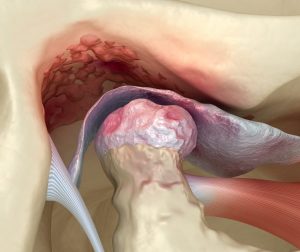
A dentist trained in this area can help determine whether your pain is related to your jaw alignment, discuss treatment options, and provide a treatment plan that leads to elimination or reduction of symptoms and management long-term. This is a field of dentistry known as Neuromuscular Dentistry, and a dentist with training in this field can help you determine, understand, and treat your TMD.
How is the Initial Diagnosis Made?
Neuromuscular Dentistry is based on establishing a balance between the muscles of the head and neck, the temporo-mandibular joints, and the teeth. Modern neuromuscular dentistry utilizes ultra low frequency TENS therapy to relax the muscles of your head and neck and then measures muscle activity, jaw movements, and joint in order to establish an ideal healthy bite position.
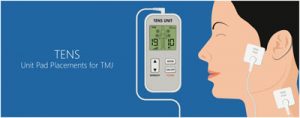 TENS stands for Transcutaneous Electrical Nerve Stimulation, and this allows for a gentle signal to be sent to the facial muscles in order to relax them and allow your jaw to briefly move into its ideal position, which is recorded and used to help diagnose and treat your condition.
TENS stands for Transcutaneous Electrical Nerve Stimulation, and this allows for a gentle signal to be sent to the facial muscles in order to relax them and allow your jaw to briefly move into its ideal position, which is recorded and used to help diagnose and treat your condition.
During your initial Records Appointment, scans of your teeth will also be done with a digital scanner in order to record a 3-dimensional image of your teeth.
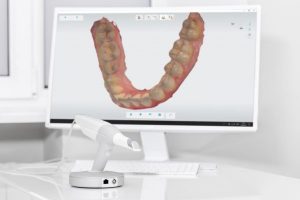
Together with the TENS bite and other measurements and data collected, these scans are then placed on an articulator, which is a dental device that helps us determine the misalignment in 3 dimensions and come up with treatment options.
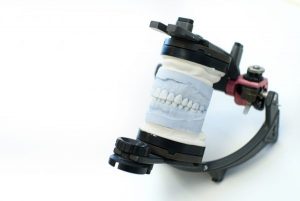 After reviewing all the data and information collected, a consultation to discuss results and possible treatment options will be scheduled. Since each pain patient is different, and each case can have a multitude of various components that contribute to pain and other symptoms, treatment options can vary widely.
After reviewing all the data and information collected, a consultation to discuss results and possible treatment options will be scheduled. Since each pain patient is different, and each case can have a multitude of various components that contribute to pain and other symptoms, treatment options can vary widely.

